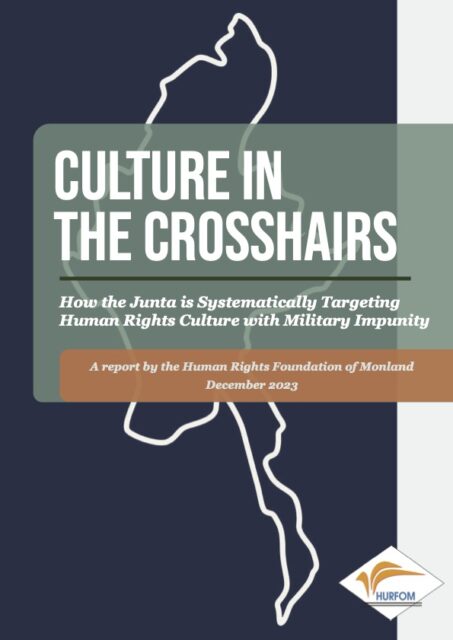“Culture in the Crosshairs: How the Junta is Systematically Targeting Human Rights Culture with Military Impunity”

New Briefing Paper, Human Rights Foundation of Monland

Introduction
For nearly three years, the Burma Army has attempted to distort reality and its perception on the global stage as the government and legitimize representatives of the country. The junta’s illusions have not fooled the people, who reject the military junta as any entity of authority and leadership. As the regime continues and fails to seek recognition, they are also losing a war they have been embroiled in for decades.
In stark retaliation for lost bases and control, civilians have been targeted in a widespread campaign to demoralize support for the opposition. In Karen State alone, at least 700,000 people have been internally displaced since 1 February 2021. The Human Rights Foundation of Monland (HURFOM) has been documenting human rights violations in Mon State, Karen State and the Tanintharyi region and has continuously presented evidence of military impunity. Of the dozens of cases recorded, no victim has seen justice. The security, safety, and stability of civilian livelihoods have dramatically decreased across all target areas.
This briefing paper, ‘Culture in the Crosshairs,’ was written in line with the 2023 Human Rights Day theme: “Consolidating and Sustaining Human Rights Culture into the Future.” The junta in Burma has never respected the cultures or identities of ethnic people. HURFOM argues that the military is not only committing human rights violations, but they are also attempting to disintegrate ethnic cultures and traditions in Southeastern Burma.
The International Covenant on Economic, Social, and Cultural Rights (ICESCR) aims to ensure the protection of economic, social and cultural rights, including Freedom from discrimination and the right to equality between men and women, as well as the right to work. Myanmar is neither a party to the International Covenant on Civil and Political Rights (ICCPR), the ICESCR, nor their optional protocols. However, Chapter 8 of the junta’s military-drafted 2008 Constitution guarantees many ESC rights. Nonetheless, the Constitution makes a mockery of human rights. It has no legitimacy – not even to the junta who violated its terms when they attempted a coup. This further emphasizes that there is no basis for trust in the military to follow through with any commitments to peace or democracy, including cultural preservation, even in their own doctrines.
Historically, brutal campaigns by the Burma Army targeted ethnic people and attempted to assimilate them into Burman identities and politics. This became well known as the practice of ‘Burmanization,’ a deliberate strategy used to try and erase the culture of ethnic people through fear and scorched-earth campaigns that sent thousands of people to border countries such as Thailand, India, and China. ‘Divide-and-rule’ tactics were also deployed in which the junta tried to make other ethnic groups represent one another in a bid to break ties of solidarity.
In the current situation, the people of Burma are fighting to restore their rights and freedoms and preserve their culture. This requires creating new systems that protect and uphold human rights through transitional justice mechanisms and building an ecosystem that places equal value on promoting a human rights culture. More awareness raising and information sharing is required. Thus, HURFOM maintains the importance of telling the lived experiences of the people on the ground and ensuring they are not ignored or neglected. There must also be increased support for human rights organizations operating on the ground. The preservation of their culture is interlinked with their fight for their ongoing survival.
When the junta initiates conflict on ethnic land, they are deliberating, trying to use the ecosystem that sustains the way ethnic people survive and adapt. This short briefing paper will contextualize the human rights violations in Mon State, Karen State, and Tanintharyi region from July to November 2023 through a cultural lens, including how attacks on civilians in ethnic areas target their livelihood traditions, connection to their land and environment, and their communities. It will conclude with calls and recommendations to the international community.

